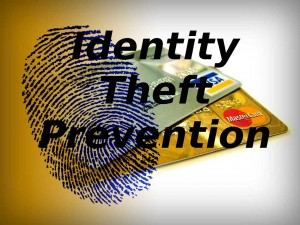
Forget the bogey man, dragons and things that go bump in the night. Save the fear factor for the unscrupulous among us who steal our identities and leave us floundering, financially fractured and caught in a web of never-ending effort to prove who we are.
The stories are rampant. Every year, more than 16 million Americans are victimized by computer hackers, mailbox thieves and others who have made a science of cheating their fellowmen. The number probably is higher, because not all incidents are reported. The ill-gotten loot adds up to some $24.7 billion, topping all other property crime losses combined by $10 million.
It seems that everyone you talk to knows someone in their circle of family and friends that has suffered from the ill effects of this crime.
The crooks prefer older persons as targets. They have better credit and more accounts and they tend to be somewhat less tech savvy than today’s perpetrators. They are not as apt to monitor their financial resources as those who have grown up in a digital world.
The AARP conducted a poll among 2,250 older Americans and found that more than 12 percent had had unauthorized items purchased in their name in the past year. Law enforcement is overwhelmed, and few of the fraudulent cases are resolved. Among police agencies, the saying goes that “only the dumb ones get caught.”
How to protect yourself? Here are 10 hints:
1. Locking Mailbox
Get a locking mailbox or use a post office box. Almost 60 percent of Americans report they do not have a locked box, making them prime for the snoops who are looking for identify information.
2. Online Accounts
Get online accounts for all bank and credit cards so information does not go
by post. If you haven’t already gone online, you are part of the 50 percent of Americans who are vulnerable through this route.
3. Clean Car
Never leave personal information in your car. Some 20 percent of Americans in the age group 18 to 49 say they have left a wallet or purse in a locked car over the past week. Those over that age are more prone to be careful, with only 8 percent reporting having left personal items in a car.
4. Shred Documents
Shred documents that contain personal information, such as bank and credit card statements, tax forms and medical bills. Forty-one percent of those over age 50 shred at least once a week.
5. Lock Electronics
Lock devices such as smartphones, laptops and tablets with pass codes to prevent unauthorized use. Some 44 percent of those over 50 say they haven’t set up pass codes on their smartphones.
6. Close Old Credit Accounts
Close out old credit card accounts if you no longer use them. They are tempting come-ons for thieves.
7. Leave Your Social Security Card At Home
Don’t carry your Social Security card. Even the last four digits can give a fraudster enough information to damage your security.
8. Check On Your Bank Account Activity
Regularly check bank account and credit card statements. About 75 percent of Americans who bank online take this precaution.
9. Open Online Accounts With Credit Bureaus
Establish online accounts with Equifax, Experian and TransUnion, the three credit reporting agencies. They may help you spot any irregularities in your accounts early. Sixty percent of the country’s citizens haven’t taken this precaution.
10. Set Fraud Alerts
Put fraud alerts on your accounts with the credit agencies and consider a credit freeze. Too many who receive a fraud alert, 84 percent, failed to follow through with fraud alerts on their credit files; fewer than 6 percent considered freezing credit.